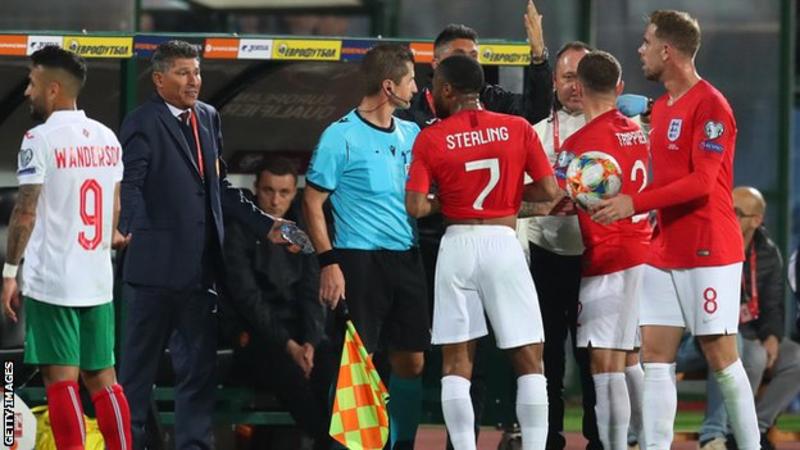English football experienced one of its ‘worst ever nights’ stated the FA Chairman Greg Clarke in the post-match press conference. Clarke was sent out with manager Gareth Southgate, rather than one of the players, to spare the team from having to recount the ordeal they had been through in Sofia.
England fans, players, coaching staff and officials had warned of this; and it made the racism feel even more vitriolic. The t-shirts that many of the Bulgarian racists – we shall call a spade a spade – were wearing made a mockery of the UEFA ‘Respect’ slogan, with the word ‘No’ placed in front. It was clear from the outset what they thought of these concerns.
In what should have been a seminal night in the careers of the likes of Tyrone Mings – making his international debut – instead became an unforgettable one, but for the wrong reasons.
Tammy Abraham had said on Friday in Prague that he hoped the game would pass without incident; that the Bulgarian fans could prove everyone wrong. However, the Bulgarian coach, Krasimir Balakov responded by saying that England ‘had a bigger racism problem than Bulgaria’. What is a ‘bigger’ racism problem?
It should be noted, that England certainly has a problem: Gareth Southgate has been preaching this line ever since he took the England job. Let’s sort out our house before pointing out the flaws in theirs. But the racism for the likes of Raheem Sterling, Mings and Abraham received on Monday night was so deliberately public and provocative.
The 6-0 win, to put England on the cusp of another international tournament, became a sideshow. The game was halted twice before half-time; it appeared at that stage, following an almost comical 6 minutes added time for stoppages, that the game would be abandoned.
But they carried on. Defiantly, bravely, and in what seemed like a real ‘we will not let you win’ attitude to the group of Bulgarians who were committing such heinous acts.
Despite the game being finished and UEFA’s three-step protocol not being fully enacted, this still felt like a big night for football. A night where the action finally became direct, and not just one of ‘oh, we’ll sort it out with a £10,000 fine and potentially a part stadium closure.’
The decisions to stop the game seemed a far cry from the days of Kevin Prince Boateng getting booked for walking off the pitch in a Seria A game for experiencing racist abuse.
The racism here was undeniable. Everyone saw the Nazi salutes; everyone could hear the monkey noises and the clear booing that greeted any Black English touch of the ball. It should be asked then, why the feigned innocence from Balakov, whose very deliberate use of the word ‘if’ in the press conference felt deliberately pointed. Why the need for Bulgaria’s goalkeeper to state after the game that he felt his nations’ fans behaved excellently?
This all seems emblematic of a structure that has allowed this racism to fester and broaden itself over a number of years. There is a dangerous far-right surge spreading itself across Europe presently: from Westminster, down to Madrid and across to Sofia. Far-right sentiment is being expressed, quite openly, far and wide and to much avail.
That UEFA refused to hand out any meaningful punishment the last time this happened in Sofia, and the last time before that, and the one before that, leads directly to these incidents. A part-stadium closure? Give us a break. A £10,000 fine that does not hit the pockets of the offenders? It is difficult not to laugh.
England has its own problems with racism; Ian Wright spoke – as usual – eloquently following the match about how the English football ‘pyramid’ is riddled with racism and racist events.
Yes, we should be looking to arrange our own house and stamp it out, but this should not stop us from taking other nations with us. Europe, once again, stops to watch what UEFA’s next move will be.
I would not be too hopeful it’s the right one.
Image credits to BBC News and Getty Images.

